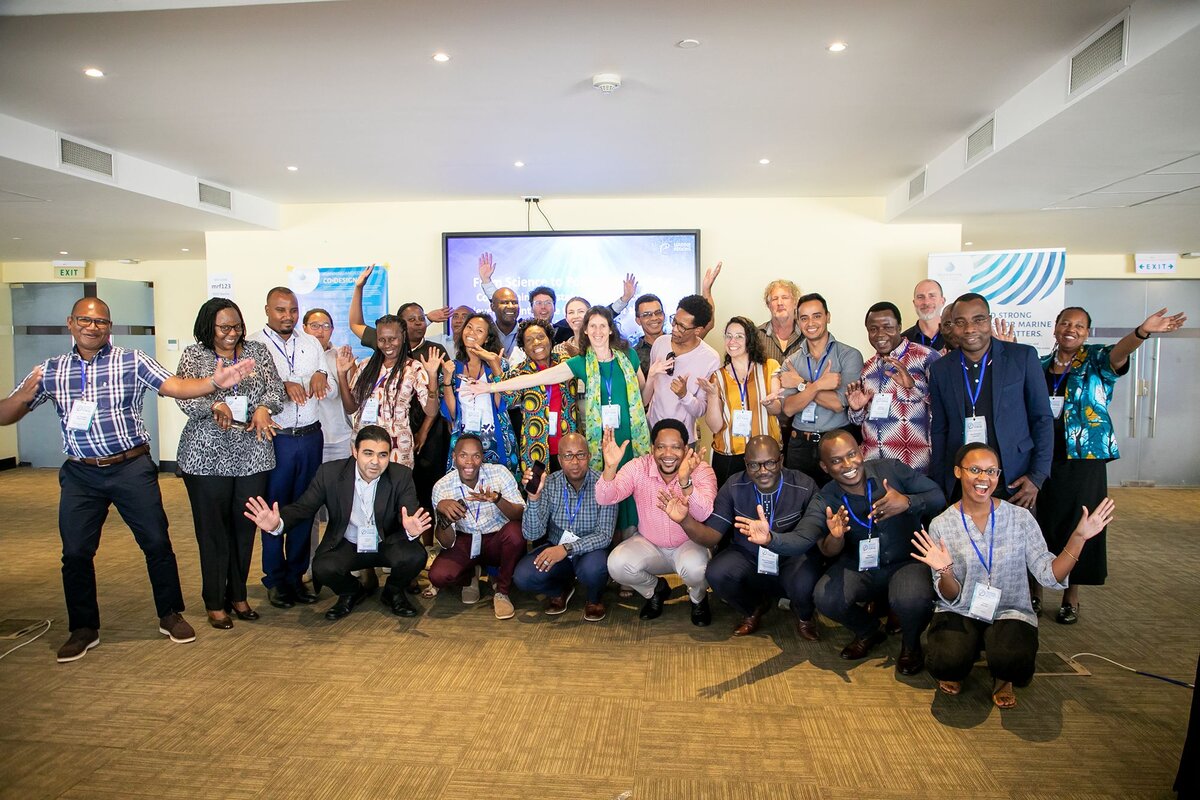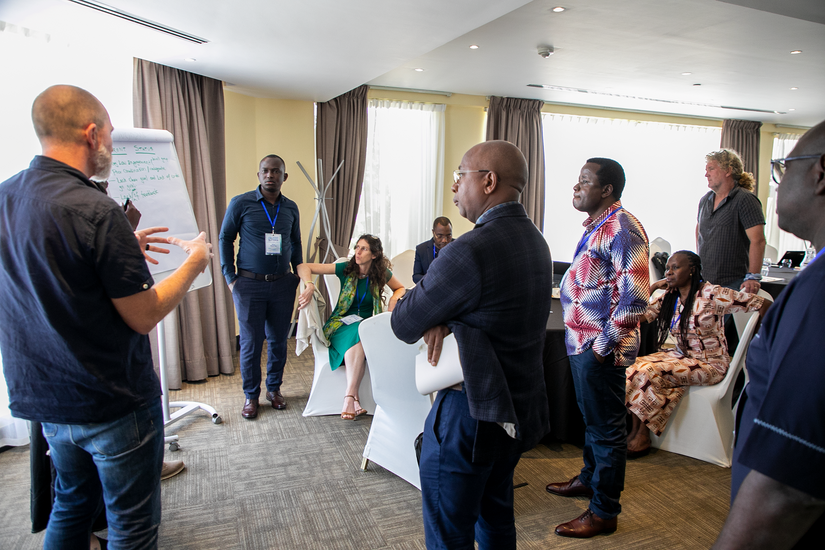
Co-designing at the science, policy and society interface for sustainable blue economic development - Insights into our Session at the Marine Regions Forum 2023
How to improve the interface between science, policy and society to ensure that development of the ocean economy is sustainable, inclusive and needs-based? This was the central question around 30 participants from science, policy and society discussed in our session at the Marine Regions Forum on 8 November 2023, which the initiative MeerWissen co-organized with IOC UNESCO. This session provided a space for dialogue and learning on the importance of working across the science – policy – society interface for sustainable blue economic development. It showcased examples of how co-designed transformative ocean science and knowledge has contributed to building a sustainable ocean economy at the national and sub-national levels.
In the first part of the session, Dr. Vladimir Ryabinin, representing IOC-UNESCO, highlighted the need for comprehensive and sustainable ocean planning to fulfil Sustainable Development Goals (SDGs) related to the ocean. He underscored the necessity of investing in ocean science to drive such planning. “The world is facing several threats including climate change and loss of biodiversity. These challenges are ocean-science intensive and require the transformation of science into policy and action to overcome them,” Dr. Vladimir Ryabinin.
Sven Stöbener of the Deutsche Gesellschaft für Internationale Zusammenarbeit (GIZ), speaking on behalf of the German Federal Ministry for Economic Cooperation and Development (BMZ), reported on commitments to the Oceans Decade, such as the MeerWissen initiative, support for regional governance through the Western Indian Ocean Governance Initiative (WIOGI), and innovative financing in the WIO region, such as the Blue Action Fund.
In her keynote presentation, Prof. Kerry Sink from the South African National Biodiversity Institute (SANBI) defined the science-policy-society interface as the connections that link researchers, communities and decisionmakers in the exchange of information, knowledge and learning to make informed decisions that address societal needs. She focused on the importance of co-design, inclusivity, equitable partnerships and transparent knowledge sharing. These principles link science, policy and society for early problem identification and long-term effectiveness. She stressed that relationships are as important as data. “For inclusive co-design work, it is essential to build mutual understanding of benefits for different partners,” Prof. Kerry Sink.
Afterwards, practitioners shared their insights from using the co-design approach in their work. Dr. George Rushinigisha, Tanzania Fisheries Research Institute (TAFIRI), and Vatosoa Rakotondrazafy, IUCN, presented practical examples that showcased the significance of stakeholder engagement and community-led conservation in improving small scale fisheries sustainability and fisheries management. Dr. George Rushinigisha highlighted how the Fishing Data East Africa (FIDEA) project embodied the co-design principles, where science, policy, and societal interests were integrated to develop effective and equitable solutions for managing fisheries resources of Tanzania, Zanzibar and Mozambique. Regular communication, shared goals, flexibility and adaptation, and government support were some of the enabling factors for the realisation of a co-design process within FIDEA. He stressed the importance of engaging decision makers in the project events for a smooth implementation and also with communities to learn about their needs, cultural aspects and traditional knowledge. He highlighted the importance of understanding the financial systems of the donor and its requirements. For sustainability, it is key for co-financing with other partners and also ensuring ownership by the communities/beneficiaries. FIDEA successfully ensured the sustainability of fisheries management beyond project lifetime, with TAFIRI and Duke's Nicholas Institute signing a Memorandum of Understanding (MOU) to work with FAO to improve data and information on small-scale fisheries in Tanzania. TAFIRI continues with the collection of fisheries data on a monthly basis and supports reporting on SDG 14.4.1.
Vatosoa Rakotondrazafy reported about the Locally Managed Marine Area (LMMA) network in Madagascar and why locally led stewardship is needed to achieve sustainable marine management. Currently more than 280 LMMA communities with around 500.000 small-scale fishers are present in in 14 of 15 coastal regions of Madagascar. LMMAs create temporary and permanent fisheries closures and restore mangroves. They develop alternative livelihood, such as seaweed farming, and put local regulations in place. However, LMMAs are also facing several challenges, these conflicts range from resource use and allocation, lack of legal frameworks for securing and recognizing rights, lack of product valuation, limited access to markets; to harmful practices linked to poverty and remote areas.
Vatosoa emphasized that communities have local knowledge which can be strongly incorporated into the process. She mentioned that the work of the MIHARI network has led to a recognition of small-scale fishers’ contribution in Madagascar’s fisheries governance and an improved exchange and information access within LMMA Managers as well as a behaviour change of fishers.
A subsequent panel discussion provided key takeaways, including the utility of co-design in promoting inclusivity, standardising methodologies, embracing diversity and investing in participatory processes. Following the panel discussion and these inspiring inputs, session participants had the opportunity to practice co-design in three working groups on inclusive co-design, impactful co-design and capacities for co-design.

In the first working group on inclusive co-design, participants discussed the following question: How to ensure the inclusion of relevant stakeholders (especially IPLCs and the private sector) in co-designing at the science-policy-society interface – specific roles, challenges and synergies for each group of stakeholders? Some key findings include:
- Co-identifying priorities (ensuring that science is at the service of society)
- Developing facilitation skills: interactive methods to enhance meaningful participation, with scientists as facilitators
- Building capacity for science communication
- Adaptive Management (being flexible to improve policy as resources allow)
- Institutionalising inclusive processes from the beginning: Development of a framework for inclusivity (policy and legal)
- Incooperation of management messages in science
- Appropriate methods for identifying and mapping key stakeholders and agreeing on roles and responsibilities
- Dedicating adequate resources to support the process
How to strengthen co-designing at the science-policy-society interface for sustainable solutions to societal challenges that deliver required impacts? This question was at the heart of the second working group on impactful co-design. Participants of this working group shared the following findings:
- Promoting bottom up approaches by integrating multiple perspectives at larger scale
- Strengthening representation, including recognition of weaker voices, accountability of representation and representation of all stakeholder languages
- Trial and test approaches (proto-typing): context-specifity
- Measuring success (framework and metrics): supporting co-design platforms, case studies of success (e.g. One Ocean Hub), multidisciplinary science, impact practitioners / boundary spanning people/organization
In the third working group on capacities for co-design, we asked participants how to develop capacities for co-design at the science-policy-society interface that enable evidence-based decision-making and demand-driven action. Some key findings include:
- Conduct a needs assessment: Identifying who needs what and who needs whom
- Create a space/platform for scientists, policymakers and society to communicate. It needs to be co-designed and co-managed by representatives of all stakeholders involved
- Training in communication skills that are relevant to all stakeholders
- Develop capacity for inclusive and effective governance processes
At the end of the session, Dr. Jacqueline Uku, Chair of the Ocean Decade Africa Task Force, highlighted some key take aways from the session, such as the need for frameworks for methods/tools and matrices to measure success, the need to allocate resources for research, the identification of stakeholders across the spectrum (inclusive process), the need for resources for processes and avoidance of replication, the inclusion of local people in publications and the need to communicate key legal frameworks to society. Dr. Uku highlighted the Ocean Decade Africa Road Map and its nine priority Decade themes for Africa to drive the implementation of the Oceans Decade in Africa. She also presented the Decade Action Call Number 6 with four different parts. More information on the call: Ocean Decade launches new Call for Decade Actions No. 06/2023 that will support co-design of new Decade Actions in Africa and Caribbean SIDS - Ocean Decade